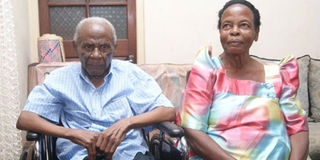Wycliff Kiyingi: the legacy of Uganda’s Shakespeare

Wycliff Kiyingi and his wife. courtesy PHOTO
What you need to know:
Kaya lauds Kiyingi as a genius for his exceptionally large corpus of exceptionally quality work, which stands the test of time by being relevant to this day. Particularly, Kaya lauds the way he approached very serious issues of his society in a very simple and humorous way, saying Kiyingi is a man who wrote about ordinary people in the most extraordinary ways
His send-off on Monday afternoon, at his ancestral burial grounds in Mukono District’s Ssonde village, was an honourable event, attended by a number of leading lights from the local drama industry.
The morning before the burial, a memorial tribute was paid to him at the National Theatre, where his remains were laid for the public to pay their last respects. A litany of local drama stars turned up to pay their respects, among them Christopher Mukiibi, Andrew Benon Kibuuka, Wassanyi Sserukenya, Mariam Ndagire, Fagil Mandy, Abu Kawenja, and John Ssegawa.
Yet still, it would seem as though few who are not insiders of the local drama industry got to understand why the local drama industry was sending him off with such respect and honour. It would seem like few in the general public had an idea about how great the deceased’s stature was in the Ugandan theatre corridors.
Pioneer theatre dramatist
It sounds hyperbolic when the multi-award-winning, veteran playwright Alex Mukulu describes the late Wycliff Kiyingi as “a pioneer of several genres of Ugandan drama – a man who pioneered local theatre drama, local TV drama and local radio drama”.
Yet, a cross-check with history books indicates that no native Ugandan had had their work performed at the National Theatre when Wycliff Kiyingi’s play Pio Mbereenge Kamulaali was performed there in 1953.
Moreover, the play was also the first in a local language to be staged at the National Theatre.
The book, African Popular Theatre: From Pre-colonial Times to the Present Day reveals that actually, Kiyingi didn’t just become the first native Ugandan to have their play staged at the National Theatre.
That shortly after his play made history, Kiyingi formed the country’s first theatre group to comprise native Ugandans; the African Artistes Association.
The book indicates that Kiyingi’s group adopted the mode of a travelling theatre, taking its productions to different parts of the central region.
Apparently, it is from there that other theatre groups (such as the Makerere Free Travelling Theatre of the 1960s) got inspiration, leading to the development of a fully-fledged local theatre movement in the country.
Pioneer radio and TV dramatist
African Popular Theatre: From Pre-colonial Times to the Present Day goes on to say Kiyingi was the pioneer native writer of radio and TV drama in Uganda, back in the late 1950s, and Alex Mukulu and a host of other Ugandan dramatists indeed agree. The book states that in the 1950s, a few of Kiyingi’s plays began broadcasting on the then newly-opened Radio Uganda, and later in the 60s, he began writing the radio serial play Wókulira, which was to run on the radio for more than two decades.
Alex Mukulu reminisces that while a young boy in the 1960s, the first-ever local-language radio drama he heard was Kiyingi’s Muto Nnyo Okufa.
Then when UTV (now UBC TV) was opened in 1963, Kiyingi also became the first native to have a play showing on the station, and he was to become the dominant writer in that genre too, as later his drama Obwavu Mussolo became a thrill for whoever had a TV set.
Staggering body of work
In his own narrative while still alive, Kiyingi said he had begun writing plays as a student in his teens, intimating that his drama-writing career was not much shorter than his octogenarian life. While those who consider only the time he began writing full-time have always calculated his playwriting career to be 50-something years. But no matter where one starts counting, Kiyingi’s drama-writing career is exceptionally long, and he is unanimously considered to be the most durable ever of Uganda’s playwrights.
In accordance with his exceptionally long career, the playwright has left behind a staggering body of work, comprising more than 40 plays in all drama mediums –written form, radio, TV, community drama, to name a few. Among his most known are titles such as Muduuma Kwe Kwaffe, Wokulira, Obwavu Mussolo, Losiyo Bba Ssesiliya, Gwosussa Emwanyi, among others.
Fine craft, socially conscious messages, perhaps, the greatest testimony to the quality of Kiyingi’s work is the fact that among Luganda language arts experts, the playwright is always mentioned in the same breath as M.B. Nsimbi, N.Kawere and Solomon Mpalanyi; four writers many have named as the father-figures of Luganda language writing. Kiyingi is the only dramatist on the list, others being fiction and cultural nonfiction writers!
Commenting on the quality of Kiyingi’s work, Mukulu reckons that there has never been and might never be a local drama writer with as much skill and depth as Kiyingi. Mukulu says Kiyingi’s wording was always witty and realistic, while at the same time he was making commentary on issues significant to the whole community.
On his part, theatre director/writer Kaya Kagimu, who spearheaded the enactment of Kiyingi’s play Mudduma Kwe Kwaffe early this year, is on record for having referred to the writer as Uganda’s Shakespeare.
Kaya lauds Kiyingi as a genius for his exceptionally large corpus of exceptionally quality work, which stands the test of time by being relevant to this day. Particularly, Kaya lauds the way he approached very serious issues of his society in a very simple and humorous way, saying Kiyingi is a man who wrote about ordinary people in the most extraordinary ways.
Still hailing Kiyingi’s craft, veteran educationist and longtime actor Fagil Mandy is on record saying that it is the finesse of his craft and the social consciousness of his stories that made the playwright’s work get taught on the local syllabus for Luganda drama students in secondary school.
Now with Kiyingi gone, Mandy challenges contemporary dramatists to borrow a leaf from the deceased and produce quality drama that addresses key issues in our midst for the betterment of our society.
Background
Kiyingi was born in December 1929 in Ssonde, Bukerere in Mukono District, to the late Ernest and Esineeri Kaggwe. He had his primary education at Misindye and Namugongo primary schools, his secondary education at Aggrey Memorial School and Kings College, Buddo, then joined Makerere University in the early 1950s for post-secondary education.
At Makerere, Kiyingi wrote drama for student performances at the university, and resultantly he had only completed one year when the in-charge of scholarships at the institution, Erisa Kironde, decided that the playwright would do better going on to study drama in England. Kiyingi then proceeded to the University of London.
What else?
Besides writing drama, Kiyingi one time worked as fuel station manager at Shell Uganda, taught in several schools around Kampala and also sometime worked in the media, most notably as editor of the Luganda newspaper Uganda Empya in the 1960s.
He is survived by a widow, Joan Kiyingi to whom he has been married for 60 years, as well as five children and a score of grandchildren/great grandchildren.




